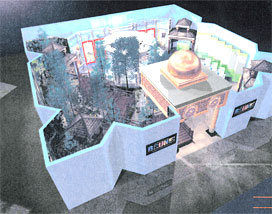Brunei
Theme / Exhibition
The present trend in global industry is based on a shift in thinking from that of a mechanical world to one that is organic, living and evolving. Nature is the ultimate model of sustainability. It has survived 4 billion years that included several cataclysmic, or extinction level events. All natural systems exhibit similar structures and traits that is increasingly recognized as the reasons for its resilience. It is also realized that nature is not a collection of organisms but an ecological system that links organic life from microbes to human beings and the gaseous, illiquid and solid mineral media in which life exists – the Biosphere. The planet is alive, and has been evolving into more complex forms and structures over eons. Nature wisdom is a realisation that nature has found a way for sustainable development, a concept that we desire but still grapple with how to put it into practice.
Nature wisdom is embedded in the designs of its structures and forms and manifested in natural processes. Over the past decades, engineers have been replacing ‘hard’ solutions (trying to tame and exploit nature for short-term gains) with ‘soft’ options (learning to work with nature for longer term gains). In the past few years, considerable progress has been made, albeit still at an incipient stage, in technological development that is modeled after nature, something known as “biomimicry”. Globally, only a tiny group of scientists and technologists in scientifically advanced countries have the capability for such researches and are therefore leading the charge in the search for sustainable or ‘environmentally benign’ technologies.
Interdisciplinary researches however are bringing to light the fact that our ancestors – before the advent of the scientific revolution – had organized their lives to fit with natural designs. Building structures, farming practices, weapons and tools, and even dances and martial arts, were based on natural designs. If one cares to observe, there is nature embedded in ancient indigenous cultures. Nature wisdom therefore can be gleaned from keen studies of traditions, traditional technologies and ancient crafts and artifacts. This is where every nation can contribute towards humanity’s quest for a sustainable future – by sharing nature wisdom embedded in the plethora of indigenous or traditional knowledge.
Negara Brunei Darussalam can contribute to Aichi 2005 by sharing with the world two very important and distinctive features of the country – its cultural and natural heritage. Firstly, Brunei is an ancient kingdom. Apart from the complex traditions and splendour of the royal court, its people came from a several indigenous communities with their own traditional cultures, which date back to about 4,000 years ago. The early communities here lived either in the rainforest or the estuary and coastal zone, in harmony with the most complex and biologically diverse of ecosystems. Secondly, modern Brunei is still largely pristine nature, with nearly 80 % of total land areas forested and marine biological resources largely unexploited. Because of the small population, there is no pressure to exploit its natural resources. The Government is therefore in a position to select industries that would serve the best interest of the people in the long term. These created a special set of conditions:
1. Brunei is able to contribute to the study of Nature Wisdom by sharing with the world some of its indigenous cultures.
2. There is opportunity for global firms at the leading edge of sustainable technologies to develop, test and market their product globally in the country.






